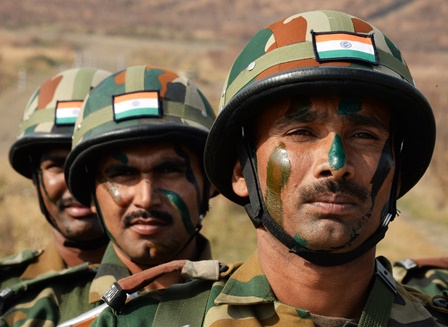ID :
574642
Mon, 08/31/2020 - 11:09
Auther :
Shortlink :
http://m.oananews.org//node/574642
The shortlink copeid
India’s Withdrawal From Kavkaz-2020 Drills Message to China, Not to Russia, Strategic Analyst Says

New Delhi (Sputnik): India will not be taking part in the joint Kavkaz-2020 war games in Russia, which will be attended by the militaries of 20 countries, including Pakistan and China. Delhi notified the Russian Defence Ministry on Friday about its withdrawal.
“Russia and India are close and privileged strategic partners”, an Indian Defence Ministry statement reads, announcing the withdrawal – to the surprise of strategic thinkers and some countries – of its contingent from the Kavkaz-2020 military exercise. The drills are scheduled to be held in southern Russia’s Astrakhan region from September 15 to 27.
While accepting the invitation from Russia last month, the Indian side was ready to take part in the exercise with 160 personnel from the Army along with 40 troops from the Indian Air Force and two Navy officers as observers there. However, the sudden announcement of pulling out from the exercise has provided reasons for speculation to those who have interest in geo-politics.
Nitin A. Gokhale, a national security analyst and author of seven books on military and strategy, has spoken to Sputnik in an interview about the decision and whether it can impact India’s ties with Russia.
Sputnik: Until last week, India was ready for war games in Russia. What transpired in the last few days for New Delhi to decide to pull out from Kavkaz-2020?
Nitin A. Gokhale: India was ready initially. But India would have had thorough deliberations to have a complete re-look at the decision. And because there is no clear resolution of the border stand-off with China, India would have given the reason of coronavirus and its effect on the forces, which is also not entirely incorrect. The unofficial reason might be that India decided not to take part in the exercise with Chinese and Pakistani troops given the situation on the border. India did not want to send wrong signals to its own people and to the international community.
Sputnik: Will this impact India's relationship with organisations like the SCO and BRICS, where China is present?
Nitin A. Gokhale: That is a long-term question that we cannot really predict at the moment. But the fact remains that India has to look at its own national interest first. Preserving the SCO is not only India’s responsibility. It is also the responsibility of others. If they want India on that forum, other nations like China and Pakistan will also have to behave like nations that would like to cooperate with India. But, clearly at this moment they are not showing signs of any friendliness or any friendly gesture towards India. Therefore, I think India has taken a good decision, but Indian ministers will also attend the SCO Summit meetings as we know.
Sputnik: There were high-level deliberations among the foreign ministers of India, China, and Russia in July, where leaders indirectly conveyed a message related to the border stand-off. What kind of interactions do you foresee during Indian Defence Minister Rajnath Singh’s visit to Moscow?
Nitin A. Gokhale: I don’t think so because though there is no official confirmation on this, I saw some official reports that Rajnath Singh will not have any bilateral meetings with his Chinese and Pakistani counterparts, which is a correct thing to do. While the SCO meeting will have the usual gathering of all the defence ministers and will be a collective meeting, there will be no harm in attending that meeting. But bilateral meetings, India has ruled out, and correctly so. I don’t think that is going to have any effect on the SCO as such.
Sputnik: Does the decision imply any message to Russia as well?
Nitin A. Gokhale: I don’t think we should read too much into this. India – Russia relations are not dependent on how India’s relations are with other countries like China and Pakistan. India has its own importance to Russia. India and Russia need each other in the defence sector. There is no message for Russia as such because anyway the two ministers are likely to go for the SCO meetings.
India only wants to send a clear message to China and Pakistan that we don’t want to be exercising with you when your actions and intents on the border are hostile. Basically, there is no point trying to pretend that the relations with China and Pakistan are normal. This kind of an approach, all countries do in international relations and foreign policy. India is just doing the right thing.
Sputnik: As the border stand-off between India and China has drawn out over four months in Ladakh, should India look for or accept any third-party mediation on the matter with China?
Nitin A. Gokhale: I don’t think India is looking for, or should look for third-party mediation. India has always dealt with its own problems bilaterally. Whether with Pakistan or China and therefore if anybody thinks India is looking for third-party mediation, he does not know the strategic autonomy that India has exercised all these years. Even in the worst of times, India never asked for mediation. Although, other parties would like to have that kind of a role, India steadfastly refuses to have any third-party mediation and I think it is the correct stand. It will also not happen this time.
The views and opinions expressed in the article do not necessarily reflect those of Sputnik.
Read more: https://sputniknews.com/analysis/202008301080321198-indias-withdrawal-from-kavkaz-2020-drills-message-to-china-not-to-russia-strategic-analyst-says/





